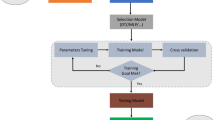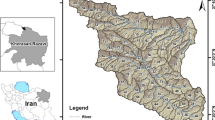Abstract
Forecasting the groundwater level is crucial to managing water resources supply sustainably. In this study, a simulation–optimization hybrid model was developed to forecast groundwater levels in aquifers. The model uses the PSO (Particle Swarm Optimization) algorithm to optimize SVR (Support Vector Regression) parameters to predict groundwater levels. The groundwater level of the Zanjan aquifer in Iran was forecasted and compared to the results of Bayesian and SVR models. In the first approach, the aquifers hydrograph was extracted using the Thiessen method, and then the time series of the hydrograph was used in training and testing the model. In the second approach, the time series data from each well was trained and tested separately. In other words, for 35 observation wells, 35 predictions were made. Aquifer’s hydrograph was evaluated using the forecasted groundwater level in the wells. The results showed that the SVR-PSO hybrid model performed better than other models in terms of Root Mean Square Error (RMSE) and coefficient of determination (\({R}^{2}\)) in both approaches. In the first approach, the SVR-PSO hybrid model forecasted the groundwater level in the next month with a training RMSE of 0.118 m and testing RMSE of 0.221 m. In the second approach, using the SVR-PSO hybrid model, the RMSE error was reduced in 88.57% of the wells compared to other models, and more reliable results were achieved. Based on the performance, the SVR-PSO hybrid model can be used as a tool for decision support and management of similar aquifers.






Similar content being viewed by others
Availability of Data and Materials
Authors have restrictions on sharing data.
Code Availability
All analyses were made by MATLAB(R2018b).
References
Adiat K, Ajayi O, Akinlalu A, Tijani I (2020) Prediction of groundwater level in basement complex terrain using artificial neural network: a case of Ijebu-Jesa, southwestern Nigeria. Appl Water Sci 10:8
Aguilera P, Fernández A, Fernández R, Rumí R, Salmerón A (2011) Bayesian networks in environmental modelling. Environ Model Softw 26:1376–1388
Akbarzadeh F, Hasanpour H, Emamgholizadeh S (2016) Groundwater level prediction of Shahrood Plain using RBF neural networks. J Watershed Manag Res 7
Al-Fugara Ak, Ahmadlou M, Shatnawi R, AlAyyash S, Al-Adamat R, Al-Shabeeb AA-R, Soni S (2020) Novel hybrid models combining meta-heuristic algorithms with support vector regression (SVR) for groundwater potential map**. Geocarto Int 1–20
Ankita P, Dadhich Rohit, Goyal Pran N, Dadhich (2021) Assessment and prediction of groundwater using Geospatial and ANN modeling. Water Resour Manage 35(9):2879–2893. https://doi.org/10.1007/s11269-021-02874-8
Ammar K, McKee M, Kaluarachchi J (2009) Bayesian method for groundwater quality monitoring network analysis. J Water Resour Plan Manag 137:51–61
Bajany DM, Zhang L, Xu Y, **a X (2021) Optimisation Approach toward Water Management and Energy Security in Arid/semiarid Regions. Environ Process 8:1455–1480
Behzad M, Asghari K, Coppola EA Jr (2009) Comparative study of SVMs and ANNs in aquifer water level prediction. J Comput Civ Eng 24:408–413
Chitsazan M, Rahmani G, Neyamadpour A (2013) Groundwater level simulation using artificial neural network: a case study from Aghili plain, urban area of Gotvand, south-west. Iran Geopersia 3:35–46
Dai H, Zhang H, Wang W, Xue G (2012) Structural reliability assessment by local approximation of limit state functions using adaptive Markov chain simulation and support vector regression. Comput Aided Civ Inf Eng 27:676–686
Deka PC (2014) Support Vector Machine Applications in the Field of Hydrology: a Review Applied Soft Computing 19:372–386
El Bilali A, Taleb A, Brouziyne Y (2021) Comparing four machine learning model performances in forecasting the alluvial aquifer level in a semi-arid region. J Afr Earth Sci 181:104244
Elbisy MS (2015) Support vector machine and regression analysis to predict the field hydraulic conductivity of sandy soil. KSCE J Civ Eng 19:2307–2316
Farmani R, Henriksen HJ, Savic D (2009) An evolutionary Bayesian belief network methodology for optimum management of groundwater contamination. Environ Model Softw 24:303–310
Ghafari S, Banihabib ME, Javadi S (2020) A framework to assess the impact of a hydraulic removing system of contaminate infiltration from a river into an aquifer (case study: Semnan aquifer). Groundw Sustain Dev 10:100301
Guzman SM, Paz JO, Tagert MLM, Mercer AE (2019) Evaluation of Seasonally Classified Inputs for the Prediction of Daily Groundwater Levels: NARX Networks Vs Support Vector Machines. Environ Model Assess 24:223–234
Hantush MM, Chaudhary A (2013) Bayesian framework for water quality model uncertainty estimation and risk management. J Hydrol Eng 19:04014015
Hasanipanah M, Shahnazar A, Amnieh HB, Armaghani DJ (2017) Prediction of air-overpressure caused by mine blasting using a new hybrid PSO–SVR model. Engineering with Computers 33:23–31
Hosseini SM, Mahjouri N (2014) Develo** a fuzzy neural network-based support vector regression (FNN-SVR) for regionalizing nitrate concentration in groundwater. Environ Monit Assess 186:3685–3699
Jalalkamali A, Sedghi H, Manshouri M (2010) Monthly groundwater level prediction using ANN and neuro-fuzzy models: a case study on Kerman plain. Iran J Hydroinformatics 13:867–876
** J et al. (2021) Support vector regression for high-resolution beach surface moisture estimation from terrestrial LiDAR intensity data. Int J Appl Earth Obs Geoinf 102:102458
Kardan MH, Roozbahani A (2016) Evaluation of Bayesian networks model in monthly groundwater level prediction (Case study: Birjand aquifer). Water Resour Manage 5
Karimipour A, Bagherzadeh SA, Taghipour A, Abdollahi A, Safaei MR (2019) A novel nonlinear regression model of SVR as a substitute for ANN to predict conductivity of MWCNT-CuO/water hybrid nanofluid based on empirical data. Physica A 521:89–97
Kennedy J, Eberhart R (1995) Particle swarm optimization (PSO). In: Proc. IEEE International Conference on Neural Networks, Perth, Australia, pp 1942–1948
Kouziokas GN, Chatzigeorgiou A, Perakis K (2018) Multilayer feed forward models in groundwater level forecasting using meteorological data in public management. Water Resour Manage 32:5041–5052
Krause P, Boyle D, Bäse F (2005) Comparison of different efficiency criteria for hydrological model assessment
Li Y, He L, Peng B, Fan K, Tong L (2018) Remote sensing inversion of water quality parameters in longquan lake based on PSO-SVR algorithm. In: IGARSS 2018–2018 IEEE International Geoscience and Remote Sensing Symposium, IEEE, pp 9268–9271
Liu D, Mishra AK, Yu Z, Lü H, Li Y (2021) Support vector machine and data assimilation framework for Groundwater Level Forecasting using GRACE satellite data. J Hydrol 603:126929
Malekzadeh M, Kardar S, Saeb K, Shabanlou S, Taghavi L (2019) A novel approach for prediction of monthly ground water level using a hybrid wavelet and non-tuned self-adaptive machine learning model. Water Resour Manage 33:1609–1628
MATLAB P (2018) 9.5.0.944444 (R2018b) Natick, Massachusetts: The MathWorks Inc
Mirarabi A, Nassery H, Nakhaei M, Adamowski J, Akbarzadeh A, Alijani F (2019) Evaluation of data-driven models (SVR and ANN) for groundwater-level prediction in confined and unconfined systems. Environ Earth Sci 78:489
Mirzavand M, Ghazavi R (2015) A stochastic modelling technique for groundwater level forecasting in an arid environment using time series methods. Water Resour Manag 29:1315–1328
Moghaddam HK, Moghaddam HK, Kivi ZR, Bahreinimotlagh M, Alizadeh MJ (2019) Develo** comparative mathematic models, BN and ANN for forecasting of groundwater levels. Groundw Sustain Dev 9:100237
Mukherjee A, Ramachandran P (2018) Prediction of GWL with the help of GRACE TWS for unevenly spaced time series data in India: Analysis of comparative performances of SVR, ANN and LRM. Journal of Hydrology 558:647–658
Nossent J, Bauwens W (2012) Application of a normalized Nash-Sutcliffe efficiency to improve the accuracy of the Sobol'sensitivity analysis of a hydrological model. In: EGU General Assembly Conference Abstracts p 237
Panahi M, Sadhasivam N, Pourghasemi HR, Rezaie F, Lee S (2020) Spatial prediction of groundwater potential map** based on convolutional neural network (CNN) and support vector regression (SVR). J Hydrol 588:125033
Patil MB, Naidu MN, Vasan A, Varma MR (2019) Water Distribution System Design Using Multi-Objective Particle Swarm Optimisation ar**v preprint ar**v:190306127
Pearl J (1988) Probabilistic Reasoning in Intelligent Systems. Morgan Kaufmann Publishers San Mateo, Representation & Reasoning
Poli R, Kennedy J, Blackwell T (2007) Particle Swarm Optimization Swarm Intelligence 1:33–57
Rahbar A, Mirarabi A, Nakhaei M, Talkhabi M, Jamali M (2022) A comparative analysis of data-driven models (SVR, ANFIS, and ANNs) for daily karst spring discharge prediction. Water Resour Manag. https://doi.org/10.1007/s11269-021-03041-9
Rajaee T, Ebrahimi H, Nourani V (2019) A review of the artificial intelligence methods in groundwater level modeling. J Hydrol
Rezaie-Balf M, Zahmatkesh Z, Kim S (2017) Soft computing techniques for rainfall-runoff simulation: local non–parametric paradigm vs. model classification methods. Water Resour Manag 31:3843–3865
Roozbahani A, Ebrahimi E, Banihabib ME (2018) A framework for ground water management based on bayesian network and MCDM techniques. Water Resour Manag 32:4985–5005
Safavi HR, Esmikhani M (2013) Conjunctive use of surface water and groundwater: application of support vector machines (SVMs) and genetic algorithms. Water Resour Manag 27:2623–2644
Sattari MT, Mirabbasi R, Sushab RS, Abraham J (2018) Prediction of groundwater level in Ardebil plain using support vector regression and M5 tree model Groundwater 56:636–646
Sheikhipour B, Javadi S, Banihabib ME (2018) A hybrid multiple criteria decision-making model for the sustainable management of aquifers. Environ Earth Sci 77:712
Shourian M, Mousavi S, Tahershamsi A (2008) Basin-wide water resources planning by integrating PSO algorithm and MODSIM. Water Resour Manag 22:1347–1366
Smola AJ, Schölkopf B (2004) A tutorial on support vector regression. Stat Comput 14:199–222
Sreenivasulu D, Deka PC, Nagaraj G (2012) Investigation of the effects of meteorological parameters on groundwater level using ANN Artificial Intelligent Systems and Machine. Learning 4:39–44
Sujay Raghavendra N, Deka PC (2015) Forecasting monthly groundwater level fluctuations in coastal aquifers using hybrid Wavelet packet–Support vector regression Cogent Engineering 2:999414
Suryanarayana C, Sudheer C, Mahammood V, Panigrahi BK (2014) An integrated wavelet-support vector machine for groundwater level prediction in Visakhapatnam. India Neurocomputing 145:324–335
Uusitalo L (2007) Advantages and challenges of Bayesian networks in environmental modelling. Ecol Model 203:312–318
Vapnik V (2013) The nature of statistical learning theory. Springer science & business media
Wu C, Chau KW, Li YS (2008) River Stage Prediction Based on a Distributed Support Vector Regression. J Hydrol 358:96–111
Wunsch A, Liesch T, Broda S (2018) Forecasting groundwater levels using nonlinear autoregressive networks with exogenous input (NARX). J Hydrol 567:743–758
**ong W-L, Xu B-G (2006) Study on optimization of SVR parameters selection based on PSO. J Sysem Simul 18:2442–2445
Yang L, Zhao X, Peng S, Zhou G (2015) Integration of Bayesian analysis for eutrophication prediction and assessment in a landscape lake. Environ Monit Assess 187:4169
Zounemat-Kermani M, Kişi Ö, Adamowski J, Ramezani-Charmahineh A (2016) Evaluation of data driven models for river suspended sediment concentration modeling. J Hydrol 535:457–472
Funding
The authors did not receive support from any organization for the submitted work.
Author information
Authors and Affiliations
Contributions
Saeed Mozaffari: Conceptualization, Methodology, Software, Validation, Formal analysis, Writing-Original Draft. Saman Javadi: Writing-Review & Editing, Formal analysis, Supervision. Hamid Kardan Moghaddam: Formal analysis, Visualization, Investigation. Timothy O. Randhir: Writing-Review & Editing.
Corresponding author
Ethics declarations
Ethics Approval
Relevant research content in this study was in accordance with the ethical standards of the institutional and national research committee.
Consent to Participate
All of the authors consent to participate in the relevant research content in this paper.
Consent for Publication
All of the authors consent to publish the paper, and it has not been published previously nor is it being considered by any other peer-reviewed journal.
Competing Interests/Conflicts of Interest
The authors declare that they have no competing interests.
Additional information
Publisher's Note
Springer Nature remains neutral with regard to jurisdictional claims in published maps and institutional affiliations.
Rights and permissions
About this article
Cite this article
Mozaffari, S., Javadi, S., Moghaddam, H.K. et al. Forecasting Groundwater Levels using a Hybrid of Support Vector Regression and Particle Swarm Optimization. Water Resour Manage 36, 1955–1972 (2022). https://doi.org/10.1007/s11269-022-03118-z
Received:
Accepted:
Published:
Issue Date:
DOI: https://doi.org/10.1007/s11269-022-03118-z




